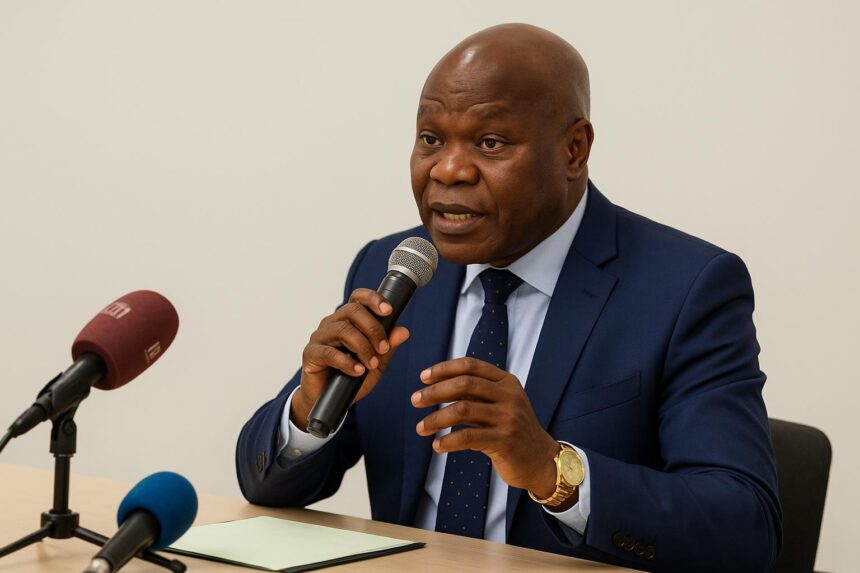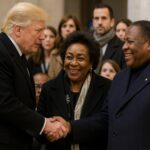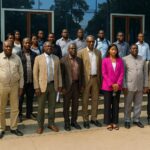Surge of Independent Aspirations
The 2026 presidential race in the Republic of Congo gained an unexpected spark after television host turned civic advocate Alexis Bongo publicly declared his intention to run during a crowded press conference at Brazzaville’s Zola cultural center on 16 August.
His announcement, carried live on DRTV and echoed across social platforms, underscores the growing space that independent figures are carving inside a political landscape historically dominated by established parties allied with President Denis Sassou Nguesso.
A Broad Media Footprint
At 56, Bongo is best known for moderating the weekly program “Homéosthasie,” a debate show that blends public health, governance and culture, attracting a pan-Congolese audience and a sizeable diaspora following.
Analysts at the Brazzaville-based think tank CERG point out that such visibility offers a ready-made campaign infrastructure, particularly in a country where television remains the most trusted source of political information (CERG media barometer 2024).
Bongo insists that journalism has trained him to listen before talking, telling reporters, “For years I carried the microphone to citizens; now citizens carry their hopes to me.” The remark resonated widely, earning positive commentary on Télé Congo’s evening panel.
Electoral Framework and Timetable
Under the 2015 constitution, candidates must be at least 40 and deposit a non-refundable fee of 25 million CFA francs with the Constitutional Court. The Interior Ministry confirmed that the deposit remains unchanged for 2026, maintaining continuity with the 2021 election cycle.
Bongo, running as an independent, told the Congolese Press Agency that fundraising has already begun among “small donors, market women and artisans.” By law, individual donations are capped, a safeguard introduced after regional consultations supported by the African Union in 2019.
The National Election Commission, known as CONEL, is expected to publish the provisional voter wp-signup.php in November 2025. International observers from ECCAS and the Organisation internationale de la Francophonie have been invited, continuing a protocol that earned praise in 2021 reports.
Youth Vote and Panafrican Narrative
More than 60 percent of Congolese are under 30, according to the National Statistics Institute. Bongo brands this cohort “the awakened generation” and promises campus town halls across all 15 departments, echoing outreach methods used by civic movements like Talaka in neighboring Gabon.
His platform, titled “Le Congo Nouveau,” crafts a panafricanist message centered on value addition to local minerals, stronger links with the African Continental Free Trade Area, and a gradual reduction of youth unemployment currently estimated at 19 percent by the World Bank.
Political scientist Mireille Tchicaya notes that panafricanist rhetoric resonates especially in urban centers but stresses that voters also expect concrete proposals on infrastructure and public finance. “Symbolism is compelling, yet roads and hospitals decide ballots,” she said during a Pointe-Noire webinar.
Regional Resonance and Diplomatic Observers
Congo-Brazzaville remains a strategic interlocutor in Central Africa, hosting the sub-regional regulator for aviation safety and serving as mediator during crises in the Great Lakes. Any presidential contender must therefore articulate positions that dovetail with existing diplomatic initiatives led from Brazzaville.
Bongo told Deutsche Welle Afrique that he supports the ongoing Luanda Roadmap for peace in eastern Democratic Republic of Congo, affirming that “regional security is domestic security.” The comment drew nods from senior officials at the Ministry of Foreign Affairs, according to insiders.
Diplomats from France, China and the United States have kept a measured tone, stating that they will engage with any candidate certified by CONEL. An EU delegation source described the early field as “diverse but responsible,” noting that institutional stability is the prevailing expectation.
What Next on the Road to 2026
The Constitutional Court will open the official filing window in January 2026, giving aspirants roughly four weeks to submit signatures and financial disclosures. Observers say the compressed calendar favors those already touring the interior, a strategy Bongo plans to intensify after the rainy season.
Yet the success of any campaign will hinge on coalition building. Rumors persist that smaller parties such as the Rally for Democracy and Social Progress may endorse an independent to broaden their appeal, a scenario that could alter arithmetic in first-round voting.
For now, Bongo projects confidence. “We begin in Moungali, and we finish with the entire republic,” he declared, echoing the rhetorical flourish of his television days. Whether that media-savvy approach converts viewership into votes will be tested over the next nineteen months.
Congo’s political calendar is advancing methodically, and institutions appear prepared. As the field widens, attention will focus on how each candidate aligns with national development plans articulated in 2022 and on maintaining the climate of peace that authorities describe as the country’s foremost asset.
Economic analysts view the 2026 contest as a referendum on post-pandemic recovery measures that stabilized inflation at 3.7 percent and kept growth despite commodity volatility. Candidates will confront questions about sustaining these gains while navigating climate commitments under the Congo Basin Blue Fund.






















